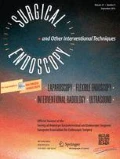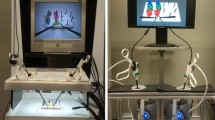Abstract
Background
Virtual reality simulation has a great potential as a training and assessment tool of laparoscopic skills. The study was carried out to investigate whether the LapSim system (Surgical Science Ltd., Gothenburg, Sweden) was able to differentiate between subjects with different laparoscopic experience and thus to demonstrate its construct validity.
Methods
Subjects 24 were divided into two groups: experienced (performed > 100 laparoscopic procedures, n = 10) and beginners (performed <10 laparoscopic procedures, n = 14). Assessment of laparoscopic skills was based on parameters measured by the computer system.
Results
Experienced surgeons performed consistently better than the residents. Significant differences in the parameters time and economy of motion existed between the two groups in seven of seven tasks. Regarding error parameters, differences existed in most but not all tasks.
Conclusion
LapSim was able to differentiate between subjects with different laparoscopic experience. This indicates that the system measures skills relevant for laparoscopic surgery and can be used in training programs as a valid assessment tool.



Similar content being viewed by others
References
Feldman LS, Sherman V, Fried GM (2004) Using simulators to assess laparoscopic competence: ready for widespread use? Surgery 135: 28–42
Grantcharov TP, Bardram L, Funch-Jensen P, Rosenberg J (2003) Learning curves and impact of previous operative experience on performance on a virtual reality simulator to test laparoscopic surgical skills. Am J Surg 185: 146–149
Grantcharov TP, Kristiansen VB, Bendix J, Bardram L, Rosenberg J, Funch-Jensen P (2004) Randomized clinical trial of virtual reality simulation for laparoscopic skills training. Br J Surg 91: 146–150
Grantcharov TP, Rosenberg J, Pahle E, Funch-Jensen P (2001) Virtual reality computer simulation. An objective method for the evaluation of laparoscopic surgical skills. Surg Endosc 15: 242–244
Hyltander A, Lilegren E, Rhodin PH, Lonroth H (2002) The transfer of basic skills learning in a laparoscopic simulator to the operating room. Surg Endosc 16: 1324–1328
Satava RM (2001) Surgical education and surgical simulation. World J Surg 25(11): 1484–1489
Schijven M, Jakimowicz J (2003) Construct validity. Experts and novices performing on the Xitact LS500 laparoscopy simulator. Surg Endosc 17: 803–810
Seymour NE, Gallagher AG, Roman SA, O’Brien MK, Bansal VK, Andersen DK, Satava RM (2002) Virtual reality training improves operating room performance: results of a randomized, double-blinded study. Ann Surg 236(4): 458–464
Author information
Authors and Affiliations
Corresponding author
Rights and permissions
About this article
Cite this article
Eriksen, J.R., Grantcharov, T. Objective assessment of laparoscopic skills using a virtual reality stimulator. Surg Endosc 19, 1216–1219 (2005). https://doi.org/10.1007/s00464-004-2154-y
Received:
Accepted:
Published:
Issue Date:
DOI: https://doi.org/10.1007/s00464-004-2154-y




